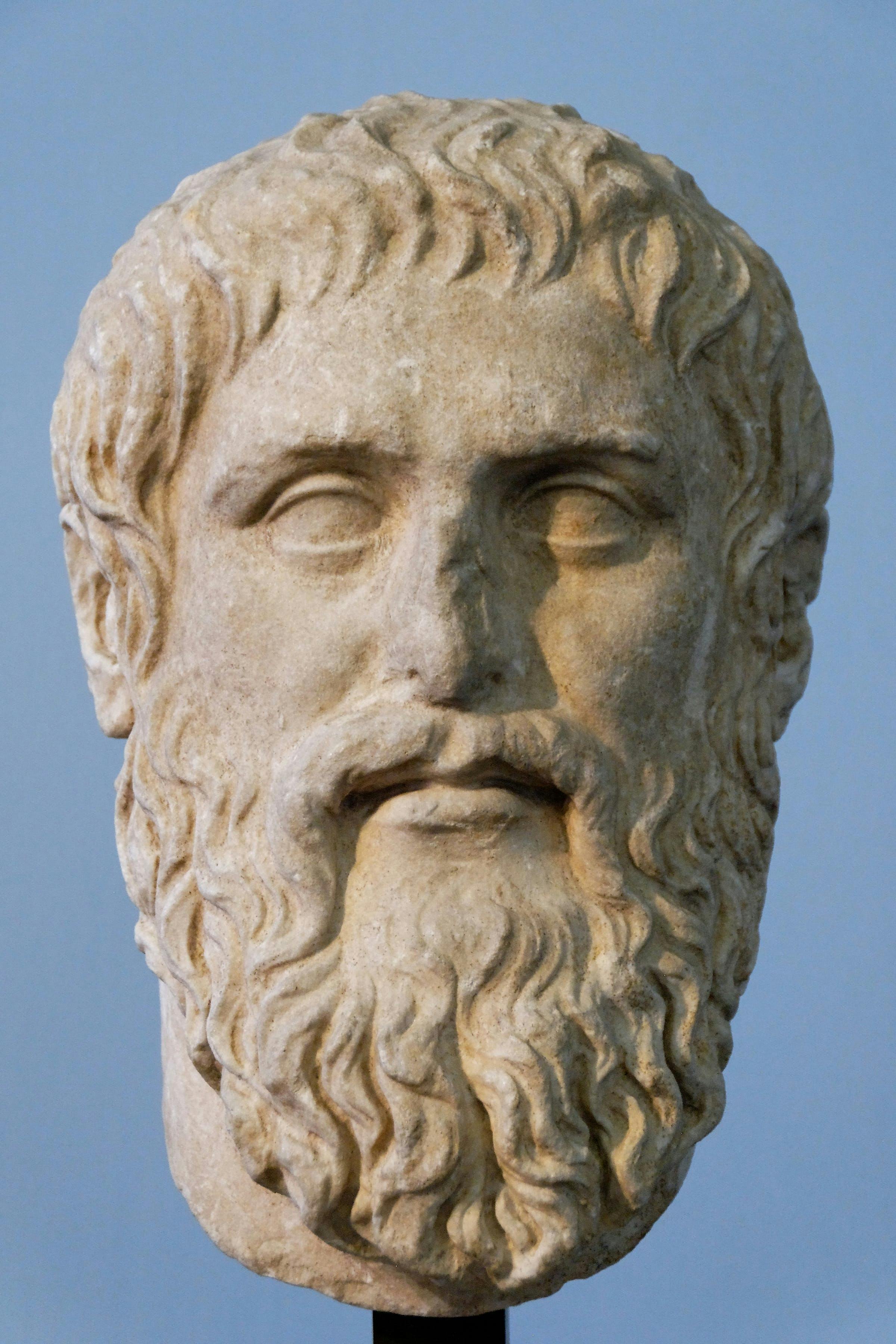Plato
Reasoning our way out of the cave
Intro
Plato was one of the earliest ancient Greek philosophers and is undoubtedly one of the most influential thinkers in the canon of Western philosophy. His teacher was none other than Socrates, another legendary figure in this tradition. However, unlike Socrates, who never wrote anything down, Plato wrote dozens of texts, including the Republic, The Symposium, and The Apology.
Plato was a utopian thinker; he spent a lot of his time wondering and writing about how society could be reformed. At the same time, he tended to be more than a tad cynical about the ability of the masses to govern themselves, as in a democracy (which Athens was at the time). Plato also differed from current scientific thought in his embrace of rationalism over empiricism, believing that reason is the only way to apprehend the truths of the universe.
Still, Plato’s goal was, in essence, to help people see through their own biases and flawed assumptions—things that are just as pervasive today as they were in Ancient Greece. Although he lived more than two thousand years ago, his work reflects an understanding of many cognitive biases and heuristics that have been coined by modern-day behavioral scientists.1
I am the wisest man alive, for I know one thing, and that is that I know nothing.
– Plato, Republic2
On their shoulders
For millennia, great thinkers and scholars have been working to understand the quirks of the human mind. Today, we’re privileged to put their insights to work, helping organizations to reduce bias and create better outcomes.
Important concepts
“The people have always some champion whom they set over them and nurse into greatness. ...This and no other is the root from which a tyrant springs; when he first appears he is a protector.”
— Plato, Republic
The Theory of Forms – Why we can’t just trust our senses
Although the theory of Forms is one of Plato’s more abstract ideas, it speaks to a basic tenet of modern-day behavioral science: that our perceptions are often incorrect.
In Plato’s view, the pursuit of knowledge was an important virtue, and essential to wellbeing. But knowledge couldn’t come from just anywhere. According to Plato, our perceptions of the world around us could not tell us about reality: not only is the physical world in a state of constant change, our senses can also lead us astray, causing us to perceive things differently than they really are.3 Instead, Plato believed that, lurking behind our imperfect reality, there was a more “real” dimension, which contained things called Forms (or Ideas)—abstract entities that he said were essentially the perfect, eternal versions of concepts that exist in our world.4 Plato touched on the idea of Forms in several of his dialogues.
“It is impossible to conceive of many without one.”
— Plato, Parmenides
One of the most famous illustrations of the theory of Forms comes from Plato’s Allegory of the Cave. In this dialogue, Socrates tells his listener to imagine a bunch of men who have spent their entire lives imprisoned in a cave. The men are chained up so that they face the cave wall, while a small fire burns behind them. Occasionally, people and animals walk through the cave, and the fire casts their shadows onto the wall for the men to see. Because the men have only ever known life in this cave, they believe that these shadows are real objects; they don’t realize that they are only imitations, partial reflections, of real entities passing by. According to Plato, the objects we encounter in the physical world are like shadows, while the things that cast them are like the Forms.
In our everyday lives, our understanding of the world is often influenced by what the Greeks called doxa: common beliefs or popular opinions.5 In Plato’s view, these beliefs often lead us to make irrational decisions, because they appeal to the unreasoning, more base parts of our psyche. But thought and reason provide a way out of the cave. By giving ourselves time to reflect, and hold our ideas up to critical examination, we can avoid acting on the basis of a flawed understanding of things, and hopefully come closer to comprehending the Forms.6
While Plato’s ideas about a separate realm of perfect Forms might seem a tad out-there (don’t worry; not even Plato himself claimed to understand it fully), his core insight—that we can’t always trust our senses—is now a fundamental principle of the behavioral sciences. Thousands of years after the philosopher’s death, Daniel Kaheman, a pivotal figure in behavioral economics, would write in his book, Thinking, Fast and Slow, that “we are blind to our own blindness.” Plato understood this well, even though he didn’t have the empirical data to prove it.
“Educators should devise the simplest and most effective methods of turning minds around. It shouldn't be the art of implanting sight in the organ, but should proceed on the understanding that the organ already has the capacity, but is improperly aligned and isn't facing the right way.”
― Plato, Republic
The Socratic dialogues – Finding truth through trial and error
All of Plato’s writings take the form of a conversation between two characters, one of which was almost always a (partially fictionalized) version of his old philosophy teacher, Socrates. By communicating his ideas through this Socratic method, Plato not only showed how reasoning could be used to test the validity of a theory, but did so in a way that put the reader in the driver’s seat, forcing them to engage more deeply with the material.
The Socratic method was first introduced by Socrates himself, but because Socrates never wrote any books, Plato was the one who gave this mode of inquiry a lasting life, through his many dialogues. In all but one of these, Socrates is a main character, who reveals the inconsistencies in another character’s beliefs by asking them question after question. Of Plato’s philosophical works, the Republic is the most famous.
The Socratic method has a very similar structure to the scientific method we use today. Both start with asking a question and forming a hypothesis, which is then tested against some observation and revised if necessary.7 It is also an important educational tool, because it asks students to think critically about an idea from many different angles. Some psychologists have also proposed using the Socratic method as a tool in therapy.8
The Socratic dialogues are also one of the only written sources we have that tells us about what Socrates was like and what he believed, although it’s not clear how much of the fictionalized Socrates’ lines represent the real Socrates, and how much is actually Plato speaking through him.
Biography
“Wonder is the feeling of a philosopher, and philosophy begins in wonder.”
— Plato, Theaetetus
Plato was born around 428 BC to an aristocratic family. His heritage was a mixed bag: on the one hand, his father’s line was supposedly descended from the god Poseidon (cool), but on the other, his mother was closely related to two of the Thirty Tyrants, the oligarchy that briefly seized control of Athens following the Peloponnesian War (not cool, and involved a bloody purge).9 His father Ariston died when Plato was still a child, and his mother, Perictione, remarried a politician.10
One of Perictione’s cousins was another politician, Critias, who studied with the philosopher Socrates. This means that Plato might have met Socrates at some point in his youth. However, it wasn’t until Plato was around 20 that Socrates became his teacher. Up until this point, Plato had been planning for a career as a playwright; he was about to start composing a tragedy. However, after hearing Socrates lecture in a market one day, he burned all of his early work and devoted himself completely to philosophy.11
Socrates was a social gadfly—an unconventional thinker who was known for challenging the expertise of authority figures, and even the gods. This habit eventually resulted in Socrates being put to death by the city-state of Athens, on the charge of “impiety” and “corrupting the young.”12 Given Plato’s closeness with his mentor, it is no wonder that, like Socrates, he was deeply distrustful of democracy, the system that had sentenced his teacher to death. In the Republic, Plato’s version of Socrates argues that most people are too self-centered and gullible to be trusted with the vote, and suggests instead that society be run by a group of philosopher kings, who would be educated from birth to be virtuous and wise rulers. He also discusses the theory of Forms and the allegory of the cave to make his point.
Plato’s thinking has been so influential that one modern philosopher, Alfred North Whitehead, famously said that “The safest general characterization of the European philosophical tradition is that it consists of a series of footnotes to Plato.”13 His work impacted fields including ethics, cosmology, and metaphysics,9 not to mention his student Aristotle, who would also go on to be an extremely important figure (though his philosophy differed from his teacher’s in several ways).
“Bodily exercise, when compulsory, does no harm to the body; but knowledge which is acquired under compulsion obtains no hold on the mind.”
― Plato, Republic
Additional sources
Plato’s Republic
Considered Plato’s greatest work, the Republic deals with issues of justice and the ideal form of governance.
“Plato” – The Stanford Encyclopedia of Philosophy
This entry is a more in-depth look at Plato’s life and philosophy. While a bit dense (hey, it’s philosophy), it’s a great resource for making sense of Plato, including an explanation of his theory of Forms.
What Plato knew about behavioural economics. (A lot) – Nick Romeo, Aeon
This essay goes into more detail about how Plato’s writings detailed the things that we now know as cognitive biases, a staple of behavioral science research.
“Intro to Plato” – Philosophy Tube
This video provides a brief, fun overview of some of Plato’s most important ideas, including the theory of Forms and the Allegory of the Cave.
References
- Romeo, N. (n.d.). What Plato knew about behavioural economics. (A lot). Aeon. https://aeon.co/essays/what-plato-knew-about-behavioural-economics-a-lot
- (2007, July 1). I know that I know nothing. Wikipedia, the free encyclopedia. Retrieved August 18, 2020, from https://en.wikipedia.org/wiki/I_know_that_I_know_nothing
- Macintosh, D. (2012). Plato: A theory of forms. Philosophy Now. https://philosophynow.org/issues/90/Plato_A_Theory_of_Forms
- Kraut, R. (2004, March 24). Plato. Stanford Encyclopedia of Philosophy. https://plato.stanford.edu/entries/plato/#Aca
- Nordquist, R. (2019, February 17). Doxa: Public opinion in classical rhetoric. ThoughtCo. https://www.thoughtco.com/doxa-rhetoric-term-1690480
- School of Life. (2014, October 20). PHILOSOPHY - Plato [Video]. YouTube. https://www.youtube.com/watch?v=VDiyQub6vpw&t=88s
- Maxwell, M., & Melete. (2014). How to use the Socratic method. Socratic Method Research Portal. https://www.socraticmethod.net/how_to_use_the_socratic_method/using_the_socratic_method.html
- Clark, G.I., Egan, S.J. The Socratic Method in Cognitive Behavioural Therapy: A Narrative Review. Cogn Ther Res 39, 863–879 (2015). https://doi.org/10.1007/s10608-015-9707-3
- Meinwald, C. (n.d.). Plato. Encyclopedia Britannica. Retrieved August 18, 2020, from https://www.britannica.com/biography/Plato
- History.com Editors. (2009, November 9). Plato. HISTORY. https://www.history.com/topics/ancient-history/plato#section_1
- Mark, J. J. (2009, September 2). Plato. Ancient History Encyclopedia. https://www.ancient.eu/plato/
- Socrates was guilty as charged. (2009, June 8). University of Cambridge. https://www.cam.ac.uk/news/socrates-was-guilty-as-charged
- A.N Whitehead on Plato. (n.d.). Columbia College. https://www.college.columbia.edu/core/content/whitehead-plato
- Duignan, B. (n.d.). Plato and Aristotle: How do they differ? Encyclopedia Britannica. https://www.britannica.com/story/plato-and-aristotle-how-do-they-differ
About the Authors
Dan Pilat
Dan is a Co-Founder and Managing Director at The Decision Lab. He is a bestselling author of Intention - a book he wrote with Wiley on the mindful application of behavioral science in organizations. Dan has a background in organizational decision making, with a BComm in Decision & Information Systems from McGill University. He has worked on enterprise-level behavioral architecture at TD Securities and BMO Capital Markets, where he advised management on the implementation of systems processing billions of dollars per week. Driven by an appetite for the latest in technology, Dan created a course on business intelligence and lectured at McGill University, and has applied behavioral science to topics such as augmented and virtual reality.
Dr. Sekoul Krastev
Sekoul is a Co-Founder and Managing Director at The Decision Lab. He is a bestselling author of Intention - a book he wrote with Wiley on the mindful application of behavioral science in organizations. A decision scientist with a PhD in Decision Neuroscience from McGill University, Sekoul's work has been featured in peer-reviewed journals and has been presented at conferences around the world. Sekoul previously advised management on innovation and engagement strategy at The Boston Consulting Group as well as on online media strategy at Google. He has a deep interest in the applications of behavioral science to new technology and has published on these topics in places such as the Huffington Post and Strategy & Business.






